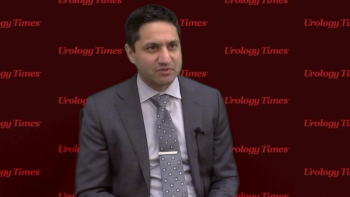
Shreyas S. Joshi, MD, MPH, discusses some of the key considerations for new agents entering the treatment landscape for BCG-unresponsive NMIBC.

Shreyas S. Joshi, MD, MPH, discusses some of the key considerations for new agents entering the treatment landscape for BCG-unresponsive NMIBC.

Panelists discuss the critical unmet need for more personalized treatment in non–muscle-invasive bladder cancer (NMIBC), emphasizing the role of biomarkers, emerging modalities like radiation, and optimized therapy sequencing to improve outcomes, as current approaches still leave many patients at risk of relapse despite expanding therapeutic options.

Panelists discuss how the evolving treatment landscape for high-risk non–muscle-invasive bladder cancer (NMIBC) demands that urologists adapt to more complex delivery methods and integrate systemic therapies into care, emphasizing the need for patient education, new workflows, and multidisciplinary collaboration to ensure equitable access to emerging therapies across all practice settings.

Panelists discuss the growing emphasis on combination therapies for high-risk non–muscle-invasive bladder cancer (NMIBC), highlighting their potential to overcome BCG resistance through synergistic mechanisms, while emphasizing the need for biomarker-driven personalization, careful management of adverse effects, and more robust data to guide optimal sequencing and patient selection.

Panelists discuss the complexities of treatment selection and sequencing in non–muscle-invasive bladder cancer (NMIBC) amid pending trial data, emphasizing the potential of emerging chemotherapy backbones, biomarker-driven personalization, and patient-centered decision-making to balance efficacy, quality of life, and evolving bladder-preserving options.

Panelists discuss the evolving non–muscle-invasive bladder cancer (NMIBC) treatment landscape, emphasizing a shift away from BCG monotherapy for lower intermediate-risk patients toward combination and novel therapies for high-risk disease, while highlighting ongoing challenges related to toxicity, cost, BCG shortages, and the need for refined patient selection through biomarkers and precision medicine.

Panelists discuss novel intravesical drug delivery systems like TAR-200 and UGN-102 that enhance chemotherapy exposure and efficacy in non–muscle-invasive bladder cancer (NMIBC), while noting challenges in tolerability and administration, and highlighting their potential to improve patient outcomes and reduce invasive procedures.

Panelists discuss the expanding clinical development of cretostimogene across multiple NMIBC populations and treatment strategies, highlighting ongoing trials exploring its use as monotherapy and in combination with agents like gemcitabine or pembrolizumab, with the goal of optimizing efficacy, safety, and bladder preservation across diverse risk groups.

Panelists discuss the final BOND-3 trial results, highlighting intravesical cretostimogene’s strong efficacy, durable responses, and excellent safety profile in BCG-unresponsive carcinoma in situ (CIS), reinforcing its potential as a well-tolerated, bladder-preserving treatment option in a population with limited therapeutic choices.

Panelists discuss the promising results of the BOND-3 trial evaluating intravesical cretostimogene for BCG-unresponsive non–muscle-invasive bladder cancer (NMIBC), highlighting its high complete response rates, favorable safety profile, and potential to offer an effective, bladder-sparing alternative without the toxicity of systemic immunotherapy.

Panelists discuss emerging immunotherapy strategies for BCG-unresponsive non–muscle-invasive bladder cancer (NMIBC), particularly the combination of BCG with systemic checkpoint inhibitors, noting promising response rates but significant toxicity concerns that currently limit widespread adoption to select high-risk patients, pending further trial data and safety protocol development.

Panelists discuss current FDA-approved treatments for BCG-unresponsive carcinoma in situ, noting varying response rates among pembrolizumab, nadofaragene, and BCG combined with IL-15 superagonist, while highlighting promising investigational combination immunotherapies like oncolytic viruses and checkpoint inhibitors that may improve outcomes in this challenging patient population.

Panelists discuss emerging data comparing bladder-sparing therapies to radical cystectomy in BCG-unresponsive non–muscle-invasive bladder cancer (NMIBC), highlighting the nuanced trade-offs in oncologic outcomes and quality of life, and emphasizing the need for shared decision-making as prospective studies like CISTO refine patient selection for personalized treatment strategies.

Panelists discuss the expanding treatment options for BCG-unresponsive high-risk non–muscle-invasive bladder cancer, highlighting the benefits and limitations of FDA-approved therapies like pembrolizumab, nadofaragene, and nogapendekin, alongside off-label use of gemcitabine-docetaxel, as clinicians strive to balance efficacy, accessibility, and individualized care amid ongoing resource challenges.

Panelists discuss the evolving definition of BCG-unresponsive non–muscle-invasive bladder cancer (NMIBC), emphasizing its critical role in identifying patients who fail adequate BCG therapy, guiding next-line treatment decisions, and determining eligibility for clinical trials exploring novel therapeutic options.

Panelists discuss how the ongoing BCG shortage has forced clinicians to adapt treatment strategies for non–muscle-invasive bladder cancer (NMIBC), balancing resource constraints with patient outcomes through dose adjustments, chemotherapy substitution, and earlier cystectomy, while emphasizing the importance of maintaining trial eligibility and adhering as closely as possible to evidence-based protocols.

Panelists discuss evolving strategies for managing non–muscle-invasive bladder cancer (NMIBC), highlighting how risk stratification, resource limitations, and emerging therapies like gemcitabine-docetaxel are shaping treatment decisions, while emphasizing the urgent need for predictive tools and biomarkers to guide personalized care.

“It is likely that more and more, these newer agents are going to play earlier and more central roles in the early treatment of BCG-unresponsive disease," says Shreyas S. Joshi, MD, MPH.

"We're very much looking forward to the new data that'll be presented, hopefully, within the next year, to see where this falls in the grand scheme of the all the new drugs coming into play here," says Shreyas S. Joshi, MD, MPH.

"We're excited about the science behind it, but we're also excited for our patients that if they can have access to this, maybe we can delay or completely avoid radical cystectomy or further aggressive treatments," says Shreyas S. Joshi, MD, MPH.